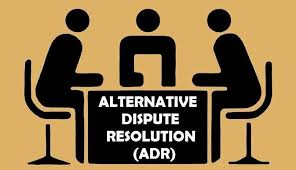
Legal recognition of ADR in India
Legal recognition of ADR in India
ADR, or alternative dispute resolution, encompasses a range of methods for resolving conflicts without resorting to litigation. Examples of common ADR processes include mediation, arbitration, and neutral evaluation, which are generally more private, informal, and less stressful than traditional court proceedings.
One method within ADR is arbitration, where a neutral individual known as an "arbitrator" listens to evidence and arguments from both parties before making a decision. Arbitration is less formal than a trial, often involving modified rules of evidence. In binding arbitration, parties are required to accept the arbitrator's decision as final, and there is usually no right to appeal. If parties disagree with the arbitrator's decision, they can request a trial.
During mediation, an impartial mediator helps the parties come to a mutually agreeable agreement without making one for them. It is a useful strategy for settling conflicts amongst neighbors, family members, and business associates.
Less formal than arbitration, conciliation seeks to help the parties to a mutually agreeable agreement. A conciliator meets separately with the parties as part of this process in an effort to reduce stress, enhance communication, clarify matters, and facilitate a negotiated settlement. Contrary to arbitration, conciliation does not need prior consent and cannot be forced onto a party who chooses not to take part.
Lok Adalats: In a nation like India where illiteracy ruled other facets of administration, Lok Adalats were historically essential. The first Lok Adalat was started in Gujarat when it was initially introduced in 1982. This movement's development was a component of the plan to lessen the weight of numerous cases that were pending on the courts. It was the synthesis of ideas about social fairness, prompt justice, a conciliation of differences, and negotiation.
They meet the needs of the less fortunate members of society. It is a good substitute for going to court to settle disagreements. In accordance with the Legal Services Authorities Act of 1987, Lok Adalats have statutory recognition. With assistance from District Attorneys, these are regularly arranged by State Legal Aid and the Advice Boards.
India's ADR laws include the Arbitration and Conciliation Act of 1996. Arbitration, carried out in accordance with the terms of the Arbitration and Conciliation Act, 1996, is one of the most widely used forms of ADR in India. The Indian parliament passed the Arbitration and Conciliation Act in 1996, which included comprehensive and detailed rules for mediating disagreements arising from legal relationships—whether or not they are contractual in nature—and from any conflicts that are connected to them. The Act of 1996 covered every detail, including the commencement of the arbitration process, the parties' hearing, and the ultimate settlement of the issue.
• The Legal Services Authorities Act of 1987: Strengthening Justice Access
In India, the Legal Services Authorities Act of 1987 is a pillar of the ADR industry. By creating legal assistance services and supporting the resolution of conflicts through mediation and arbitration, this act was a crucial step in advancing ADR processes. It sought to promote a culture of conflict resolution outside of the established judicial system by making justice available and reasonably priced for all societal classes.
• The 2023 Mediation Act
With the September presidential assent of the Mediation Bill, 2021 (the "Bill"), India now has its first independent mediation law, the Mediation Act, 2023 (the "Mediation Act"). The main purpose of the Mediation Act is to legitimize mediation as a recognized and acceptable alternative dispute resolution method and to validate any settlements reached through it, whether they are domestic or involve foreign parties and are carried out in India.
The aforementioned statutes have made lok Adalat, conciliation, arbitration, and mediation legally recognized procedures in India. However, there is no legal recognition for negotiation in India. In order to settle a disagreement, the parties engage in negotiation as self-counselling. The process of negotiation follows a predictable pattern but lacks set guidelines.
Prior to the Mediation Act of 2023, mediation was not a formal process; now, it now possesses legal authority and can be enforced by courts.
The Delhi High Court bench of Justice C. Hari Shankar has held in Mr. Mohammad Eschar Ahmed vs. M/S Tyshaz Buildmart India Private Limited, O.M.P. (T) (COMM.) 105/2023, I.A. 22122/2023 that merely putting an arbitration clause in invoices does not constitute a valid arbitration agreement and that the applicant cannot be deemed to be bound by any arbitration agreement because it did not explicitly or implicitly accept the terms of the invoices.
Conclusion:
In conclusion, there is a new way for individuals to resolve their conflicts with the introduction of alternative dispute resolution. The flexibility, affordability, speed, and lack of formality of alternative conflict settlement techniques make them a viable substitute for legal adjudication. There is an alternative method available to parties other than going to court where there is a straightforward disagreement. For everyone, the ADR framework acts as a ladder to advancement in the court system.












comments